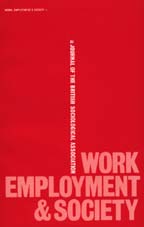Article contents
Derecognising Unions and Centralising Bargaining: analysing dualism in the oil and chemicals industries
Published online by Cambridge University Press: 19 October 2000
Abstract
There has been a recent rise in employers derecognising unions. The oil and chemical industries have been identified as critical for the analysis and practice of derecognition. This paper presents data showing that major oil and chemical firms have, on the one hand, derecognised unions for key internal staff, but on the other hand, have enforced a centralised bargaining framework for their on-site contractors engaged in the out-sourced repair, maintenance and construction work. This centralised bargaining framework has strengthened the institutional position of trade unions. The paper analyses the key factors which have pushed the same employers to act in very different ways for the two sets of workers. It finds little evidence to support arguments that a strong anti-union culture in the industries underlay employers' actions. Rather the evidence suggests that management have acted pragmatically in response to pressing short-term economic pressures. The different approaches to unions for the two sets of workers have been guided by the different economic objectives facing employers and by the different historical position of unions in helping or hindering to secure those objectives. The conclusion considers the implications of these findings for the future of derecognition in the UK.
- Type
- Research Article
- Information
- Copyright
- © 2000 BSA Publications Ltd
- 11
- Cited by




